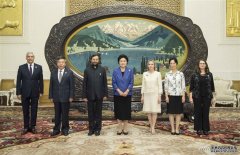Chinese expert hoping to draw New Zealand into multi-lingual
WELLINGTON, Feb. 16 (Xinhua) -- A China-born and raised language teaching expert is hoping to help New Zealand overcome its poor language skills by studying new learning methods.
Dr Shaofeng Li, a senior lecturer in applied language studies Auckland University, has won a government grant of 300,000 NZ dollars (216,780 U.S. dollars) to study the phenomenon that enables learners to pick up a foreign language through exposure to and use of the language, rather than through challenging, conscious study.
Li wanted to identify and measure the aptitudes for learning language "unconsciously" learning without being aware that you are actually "learning" and look at how the knowledge could be used in the classroom to improve learning outcomes.
"Traditionally, we talk about people having an 'aptitude' for language, and what we mean is that they learn better than others under traditional methods," Li said in a statement Thursday.
"They are good at memorizing words, analyzing sentence structure and mimicking pronunciation."
English-speaking New Zealanders had a poor record of language learning, with an estimated 80 percent of New Zealanders speaking only one language, and high school language take-up continuing to fall.
"It is a fact that many people dread learning a foreign language," said Li.
"Taught consciously, it is challenging. It takes a lot of effort and English speakers in particular can be less motivated than people who speak other languages."
But, he said, everyone learned their birth language effortlessly and efficiently so everyone had a natural ability.
"Contrary to what many people assume, adults possess a similar ability, although it may not be the same as children's language faculty," said Li.
"Learning another language widens your vision and gives you another perspective of the world. It enables you to appreciate other cultures and deal with people in a way that is beneficial for your personal life and career development."
Li said he had learned English traditionally by memorizing words and perfecting grammar, and his speaking skills came from living and working in English-speaking countries: the United States and New Zealand.
"But maybe if I'd been taught differently, it would not have taken me 20 or 30 years to get the skills I have today," he said.















